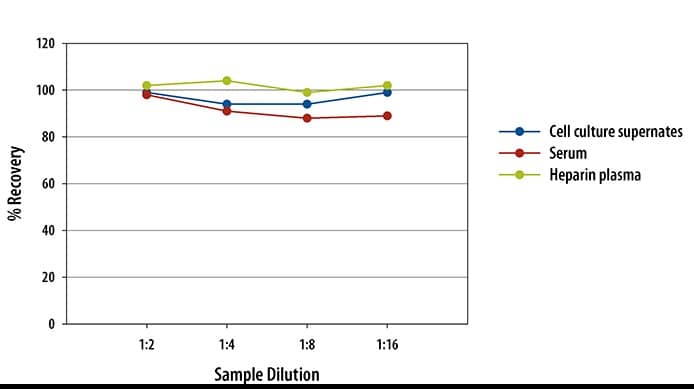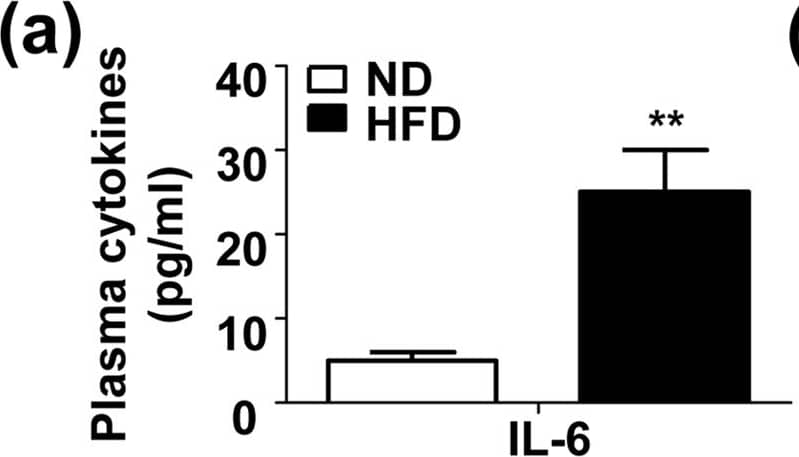Mouse IL-6 ELISA Kit - Quantikine
R&D Systems, part of Bio-Techne | Catalog # M6000B

Key Product Details
Assay Length
Sample Type & Volume Required Per Well
Sensitivity
Assay Range
Product Summary for Mouse IL-6 Quantikine ELISA Kit
Product Specifications
Measurement
Detection Method
Conjugate
Reactivity
Specificity
Cross-reactivity
Interference
Sample Values
Precision
Intra-Assay Precision (Precision within an assay) Three samples of known concentration were tested on one plate to assess intra-assay precision.
Inter-Assay Precision (Precision between assays) Three samples of known concentration were tested in separate assays to assess inter-assay precision.
Cell Culture Supernates, Heparin Plasma, Serum
| Intra-Assay Precision | Inter-Assay Precision | |||||
|---|---|---|---|---|---|---|
| Sample | 1 | 2 | 3 | 1 | 2 | 3 |
| n | 20 | 20 | 20 | 28 | 22 | 27 |
| Mean (pg/mL) | 30 | 87 | 232 | 29 | 85 | 238 |
| Standard Deviation | 2.0 | 3.4 | 8.1 | 1.8 | 7.5 | 18.1 |
| CV% | 6.7 | 3.9 | 3.5 | 6.1 | 8.9 | 7.6 |
Recovery for Mouse IL-6 Quantikine ELISA Kit
The recovery of mouse IL-6 spiked to three levels throughout the range of the assay in various matrices was evaluated.
| Sample Type | Average % Recovery | Range % |
|---|---|---|
| Cell Culture Supernates (n=5) | 110 | 86-120 |
| Heparin Plasma (n=6) | 101 | 81-115 |
| Serum (n=5) | 99 | 84-113 |
Linearity
To assess the linearity of the assay, samples containing and/or spiked with high concentrations of mouse IL-6 were serially diluted with Calibrator Diluent to produce samples with values within the dynamic range of the assay.

Scientific Data Images for Mouse IL-6 Quantikine ELISA Kit
Mouse IL-6 ELISA Standard Curve
Mouse IL-6 ELISA Kit - Quantikine
Increased production of proinflammatory cytokines and VEGF in the plasma and chondrocytes in high fat diet (HFD)-feeding mice.(a~d) levels of plasma IL-6 (a), TNF-alpha (b), IL-1 beta (c) and VEGF (d) in the C57BL/6 male mice fed with a normal diet (ND) or HFD for 8 weeks. (n = 5, **P < 0.01). (e~h) Relative mRNA expression of IL-6 (e), TNF-alpha (f), IL-1 beta (g) and VEGF (h) in the chondrocytes isolated from the 8-week ND or HFD-feeding mice. (n = 5, **P < 0.01). Image collected and cropped by CiteAb from the following open publication (https://pubmed.ncbi.nlm.nih.gov/26271607), licensed under a CC-BY license. Not internally tested by R&D Systems.Detection of Mouse Mouse IL-6 Quantikine ELISA Kit by ELISA
PYC suppressed LPS-induced proinflammatory cytokine production in BV2 microglia.Cells were incubated with the indicated concentrations of PYC or vehicle for 1h before LPS treatment (500ng/mL). After 24 h incubation, the culture supernatants were collected, and the amount of TNF-alpha, IL-6, IL-1 beta and IL-10 were measured by ELISA (A-D). Data are represented as mean ± SD from at least 3 independent experiments. *P< 0.05 compared with LPS alone. #P< 0.05. Image collected and cropped by CiteAb from the following publication (https://pubmed.ncbi.nlm.nih.gov/26367267), licensed under a CC-BY license. Not internally tested by R&D Systems.Preparation and Storage
Shipping
Stability & Storage
Background: IL-6
IL-6 induces signaling through a cell surface heterodimeric receptor complex composed of a ligand binding subunit (IL-6 R alpha) and a signal transducing subunit (gp130). IL-6 binds to IL-6 Ra, triggering IL-6 Ra association with gp130 and gp130 dimerization. gp130 is also a component of the receptors for CLC, CNTF, CT-1, IL-11, IL-27, LIF, and OSM. Soluble forms of IL-6 Ra are generated by both alternative splicing and proteolytic cleavage. In a mechanism known as trans-signaling, complexes of soluble IL-6 and IL-6 Ra elicit responses from gp130-expressing cells that lack cell surface IL-6 Ra. Trans-signaling enables a wider range of cell types to respond to IL-6, as the expression of gp130 is ubiquitous, while that of IL-6 Ra is predominantly restricted to hepatocytes, monocytes, and resting lymphocytes. Soluble splice forms of gp130 block trans-signaling from IL-6/IL-6 Ra but not from other cytokines that use gp130 as a co-receptor.
IL-6, along with TNF-a and IL-1, drives the acute inflammatory response. IL-6 is almost solely responsible for fever and the acute phase response in the liver, and it is important in the transition from acute inflammation to either acquired immunity or chronic inflammatory disease. When dysregulated, it contributes to chronic inflammation in conditions such as obesity, insulin resistance, inflammatory bowel disease, arthritis, and sepsis. IL-6 modulates bone resorption and is a major effector of inflammatory joint destruction in rheumatoid arthritis through its promotion of Th17 cell development and activity. It contributes to atherosclerotic plaque development and destabilization as well as the development of inflammation-associated carcinogenesis.
Long Name
Alternate Names
Entrez Gene IDs
Gene Symbol
Additional IL-6 Products
Product Documents for Mouse IL-6 Quantikine ELISA Kit
Product Specific Notices for Mouse IL-6 Quantikine ELISA Kit
For research use only
⚠ WARNING: This product can expose you to chemicals including N,N-Dimethylforamide, which is known to the State of California to cause cancer. For more information, go to www.P65Warnings.ca.gov.


